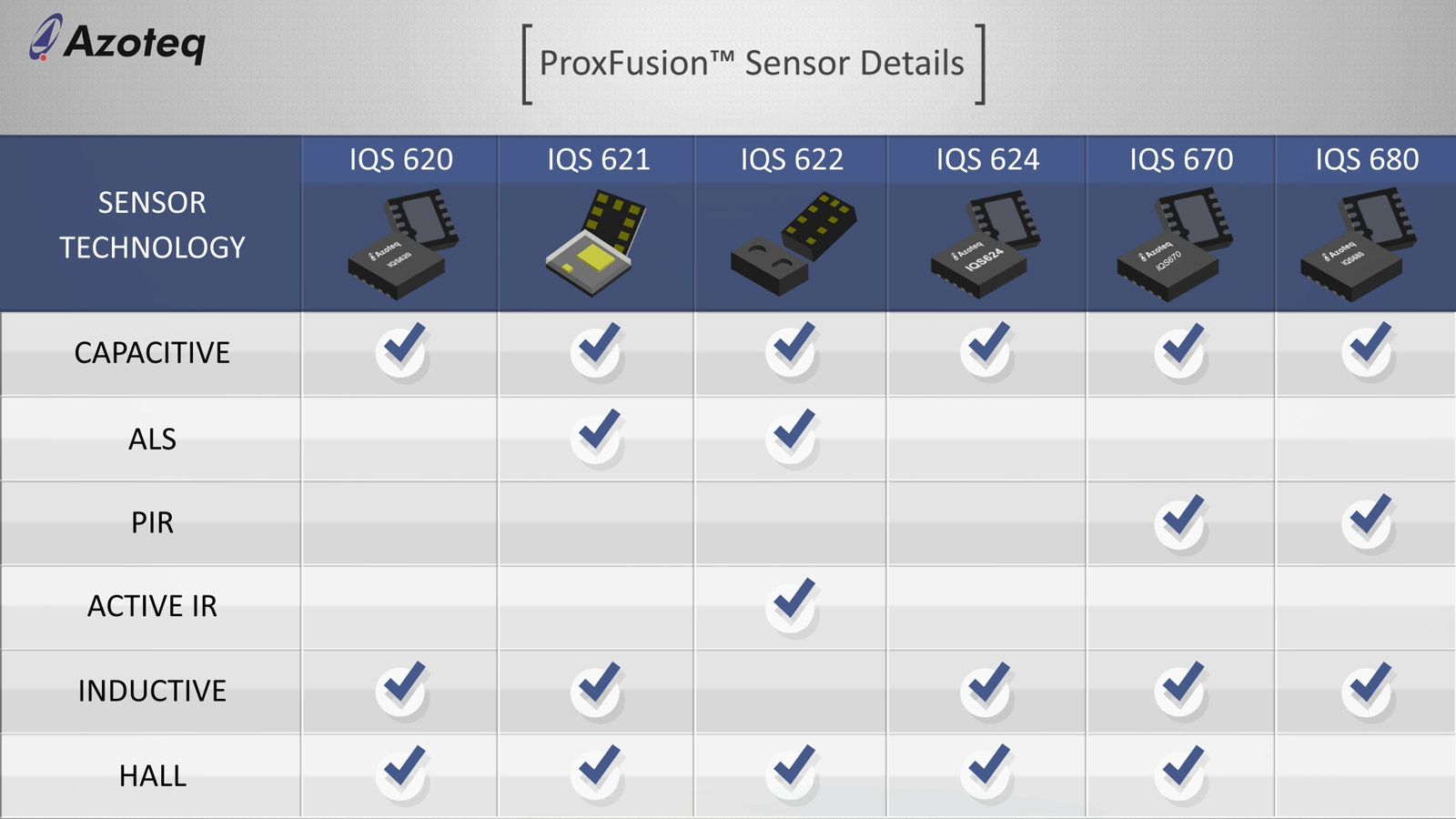Library to read and write Azoteq IQS6xx device registers via I2C.
Dependents: IQS620_HelloWorld IQS622_HelloWorld IQS624_HelloWorld IQS621_HelloWorld ... more
Library: IQS62x
Library to read and write Azoteq IQS6xx device registers via I2C.
Supported Devices
Handy Table of ProxFusion Device Features
ALS = Ambient Light Sensor PIR = Passive Infrared

IQS62x.h
- Committer:
- AzqDev
- Date:
- 2017-05-16
- Revision:
- 18:b85048ec91d2
- Parent:
- 17:2d46eabb129e
- Child:
- 20:7eb08a52b954
File content as of revision 18:b85048ec91d2:
// A class library for Azoteq IQS62x devices
// More info on IQS62x sensor ICs: http://www.azoteq.com/products/proxfusion?mbed
// ProxFusion 5-minute YouTube video: http://bit.ly/proxfusion-video
#include "mbed.h"
// Verify these 3 pin definitions if your hardware is not on the list of tested boards
#if defined (TARGET_LPC1768) || defined (TARGET_LPC11U24)
#define IQS_I2C_CLOCK_PIN p27 /* on LPC1768/LPC11U24 this is marked as p10 */
#define IQS_I2C_DATA_PIN p28 /* on LPC1768/LPC11U24 this is marked as p9 */
#define IQS_READY_PIN p26 /* on LPC1768/LPC11U24 this is marked as p8 */
#else
// If your board has an Arduino interface the definitions below will likely work, also works for Teensy
#define IQS_I2C_CLOCK_PIN I2C_SCL /* on NUCLEO boards this is marked as SCL/D15 on CN5 */
#define IQS_I2C_DATA_PIN I2C_SDA /* on NUCLEO boards this is marked as SDA/D14 on CN5 */
#define IQS_READY_PIN D2 /* on NUCLEO boards this is marked as D2 on CN9 */
#endif
#define I2C_ADR (0x44 << 1) /* I2C address of IQS62x */
#define I2CSPEED 100000 /* I2C clock speed */
#define NUMBER_OF_REGISTERS 224 /* number of registers to read from IQS62x */
#define I2CBufferSize 256 /* size of I2C read buffer */
class IQS62xIO { // basic IQS62x block read and write
public:
I2C i2c; // I2C interface
DigitalIn IQSready; // ready pin
const static int I2Cspeed = I2CSPEED; // I2C clock rate
int I2CErrorCount; // number of I2C errors
int IQSframes; // number of reads we've done
char I2CBuffer [I2CBufferSize]; // I2C read buffer
char writeFlag [I2CBufferSize]; // to remember our if we wrote to this register
char lastWrite [I2CBufferSize]; // to remember what we wrote to this register
char lastRead [I2CBufferSize]; // to remember what we read from this register
char readChanges [I2CBufferSize]; // to log changes from previous read
char readChangesEver [I2CBufferSize]; // to log changes from previous read BUT this one never forgets a change
char writeChanges [I2CBufferSize]; // to log changes from what we wrote
char * registers; // pointer to I2C read buffer
IQS62xIO(); // constructor
void writeRegister(int address, int data); // write a byte to a register
void configure(); // write configuration registers of the IQS62x
void readIqsRegisters(int start, int count); // starting at "start" read count registers
void waitForIqsReady(); // wait for IQS62x ready signal
char * getTable( int ); // fetch one of the tables containing changes in register values
// an enumerated type we use in main to select one of the tables of changes
};
// used with getTable()
enum changeType {
color_nothing=0, // no change table selected
color_any_register_that_ever_changed=1, // a table to flag any register that ever changed
color_any_register_that_changed_in_the_previous_20_reads=2, // a table to flag any register that changed in the last 20 reads
color_any_register_that_was_written_or_initialized=3, // a table to flag any register we wrote to or initialized
color_any_register_that_was_written_but_then_changed=4 // a table to flag any register we wrote to but then its value changed
};
 IQS624
IQS624
 IQS620A
IQS620A
 IQS620A-EVAL-1
IQS620A-EVAL-1
 IQS621
IQS621
 IQS621-EVAL-1
IQS621-EVAL-1
 IQS622
IQS622
 IQS622-EVAL-1
IQS622-EVAL-1
 IQS624-EVAL-1
IQS624-EVAL-1